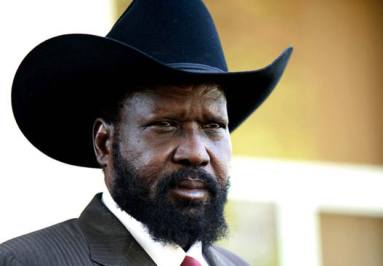Kiir in New York for UN meeting despite opposition protests
September 23, 2014 (JUBA) – South Sudan’s president, Salva Kiir, has left for the United States to attend the annual United Nations General Assembly meeting at its headquarters in New York.

Newly appointed ambassador Gordon Buay Malek and the presidential envoy for Murle affairs, Akot Lual Areech, were among an advance team dispatched to preparefor the president’s arrival the ground. Foreign affairs minister Barnaba Marial Benjamin, who followed the delegation on 20 September, was also joined on arrival by the country’s representatives in the United States and at the UN.
Malek told Sudan Tribune on Sunday that welcome preparations for the president by various South Sudanese communities in the US and Canada had been finalised.
“We have completed all the preparations. All the community leaders and individual South Sudanese have registered voluntarily to participate in the reception of the president,” he said.
SHOW OF LOYALTY
Kiir was seen off at Juba international airport by his deputy, James Wani Igga, as well as defence minister Kuol Manyang Juuk and his cabinet affairs counterpart, Martin Elia Lomuro.
In a show of loyalty all other cabinet ministers and presidentially appointed civil servants lined up at the airport to farewell the president.
“It is becoming a practice these days that all those who are appointed by presidential order have to show their presence whenever he is travelling out or returning to the country. The purpose of doing so is to register [his] presence and show loyalty to the president and respect [for] governmental practice,” said one observer on Monday.
“If you don’t do it, the security operatives attached to the institutions or departments in which you work would ask the reason and report against you for eventual dismissal. This is what many ministers and heads of department tries to avoid.”
Meanwhile, Dut Garang, a South Sudanese commentator based in Juba, says the president would be keen to use the visit as an opportunity to discuss a range of important issues related to the country’s more than nine-month-long conflict, one of which is to sell his government’s version in regards to the genesis of the conflict and how he intends to resolve the crisis.
“It would also be an opportunity for the president to seek support of the regional and world leaders to provide humanitarian assistances and for them to forge [an] understanding and build consensus around the peace process under the auspices of the intergovernmental Authority on Development (IGAD, specifically support to endorse the 25 August IGAD protocol of agreed principles as [the] basis of negotiations of the ongoing round of talks in [the] Bahar region, Ethiopia,” said Garang.
Garang says the president is also likely to solicit regional and international support for a range of post-secession issues with the government of neighbouring Sudan from which the young country seceded in 2011, specifically the demarcation of borders, the Abyei issue and progress made in implementing a 2012 cooperation agreement signed with Sudan.
WARNING TO WORLD LEADERS
However, Ayii Ayii Akol, the rebel faction’s deputy humanitarian affairs representative, said it would be “unwise” for world leaders to interact with Kiir as doing so would recognise his legitimacy as president of the country he has divided.
“Any peace efforts aimed at seeking to preserve unity and harmony of our people must isolate Salva Kiir and some members of his regime who have played a divisive and destructive role in the conflict,” Akol told Sudan Tribune on Tuesday.
“Any peace that gives him legitimacy undermines the desire of our people and it would not be sustainable and the international community should stand with our people, not one man and his friends,” he added.
Government and rebel forces aligned with former vice-president Riek Machar have been locked in an armed struggle since a political dispute in the country’s ruling party (SPLM) turned violent in mid-December last year.
Akol underscored that signing a peace deal which does not take into account the right of the victims of the conflict will not be durable and risks plunging the country into a deeper crisis.
“Our people need real and sustainable peace. They need peace that will bring real reforms, including the freedom to freely speak about how the country is run, how the resources are spent and rights to speak about the system of governance,” he said.
“The federal system is right now the popular demand of our people from [the] far end of Nimule to the farthest point in Renk, and from the farthest corners of Eastern Equatoria to the last border of the Republic of South Sudan with [the]Central African Republic in the west and Sudan. It is a demand which cannot be denied anymore, however powerful the regime may appear,” Akol added.
The former MP said it is the desire of the opposition movement to engage in efforts aimed at bringing real peace to ensure civilians could return safely to their homes.
He said it was unacceptable that many citizens continued to live in refugee and displaced camps while the resources which are supposed to be used to elevate their suffering are “given to foreign forces and mercenaries to kill the same real owners of the resources and continue to subject them to [a] hard and unbearable situation in order to sustain the will of one man and his group in power”.
Akol has urged regional leaders and the international community to unite with South Sudanese people in urging the Kiir-led leadership to peacefully stand down instead of “listening to propaganda about the events which he and some of his friends concocted to confuse the situation and divide the country”.
Akol also questioned why the UN blocked Syrian leader Bashar Assad from attending the General Assembly, but allowed Kiir to take part despite being accused of committing some of the “worst human right abuses and atrocities”.
(ST)
